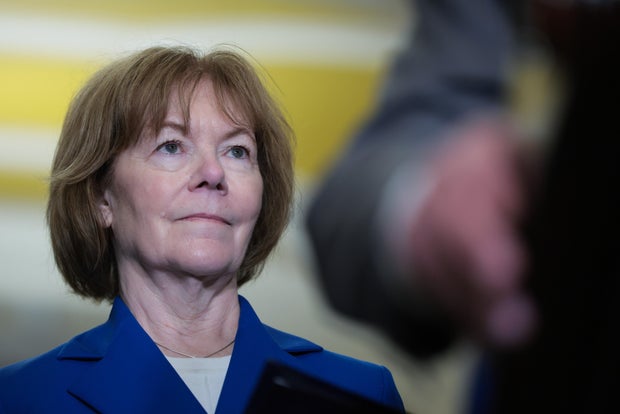In Washington, D.C., the impact of social media in shaping public discourse and its influence on personal emotions was brought into sharp relief at the U.S. Capitol. Democratic Senator Tina Smith from Minnesota took a moment on Monday to speak out against what she described as a “cruel statement” made by her colleague, GOP Senator Mike Lee of Utah, following a tragic shooting incident in Minnesota. The confrontation highlighted the deep emotions and partisan divides that can be exacerbated by online comments.
Senator Smith was personally touched by the aforementioned shootings as a close friend of the victims—Minnesota State Lawmaker Melissa Hortman and her husband—both of whom lost their lives in the incident. Another lawmaker and his spouse were also severely injured during the same tragedy. This event shook the local community and had wide-reaching emotional ramifications for their friends, family, and colleagues.
The controversy centered around a post Senator Lee made on the social platform X, previously known as Twitter, wherein he commented, “This is what happens when Marxists don’t get their way.” This statement was posted shortly after the news of the shootings broke. By Tuesday afternoon, the post had been deleted, but the damage, according to Smith, had already been done. Criticizing the insensitivity of the remark, she decided it was essential to confront Senator Lee directly about his words to make him understand the extent of the hurt they caused.
“I needed him to hear from me directly what impact I think his cruel statement had on me, his colleague,” Senator Smith revealed to the press. She expressed her distress over the fact that Senator Lee’s commentary did not just affect her but resonated painfully with others in Minnesota and beyond, who viewed the attack as a brutal and senseless act of violence.
Smith’s approach was straightforward. She believed that dialogues within the Senate too often occurred through intermediaries rather than direct conversations. By speaking to Lee personally, she hoped to underscore the personal and collective impact of his commentary, stressing the responsibility held by public figures to foster a reflective rather than reactive public discourse.
The repercussions of Lee’s statement were not confined to the boundaries of personal offense but extended into official channels. Ed Shelleby, Deputy Chief of Staff for Senator Smith, penned an incisive email to one of Senator Lee’s senior staffers. In his communication, Shelleby accused Lee of exploiting a profound tragedy for political point-scoring and questioned the moral compass behind such an action. He urged Lee’s office to recognize the additional sorrow such statements could engender during a time of profound grief.
This incident was not discussed only within the halls of the Senate or the realm of personal communications. Senator Smith, in an interview on CBS News’ “The Takeout” with Major Garrett, disclosed that Senator Lee had not issued any apology. She pointed out the broader implications of his failure to acknowledge the pain inflicted not just on her but on other victims’ families directly affected by the tragedy. Smith underscored the disrespect shown to the bereaved, particularly the children of Melissa and Mark Hortman, emphasizing how Lee’s remarks used the tragedy as a vehicle for personal gain on social media.
Further criticism was levied by Smith towards broader political behaviors, including actions taken by former President Trump, whom she criticized for pardoning individuals she believed had undermined foundational democratic institutions and principles, including committing assaults against law enforcement.
Reflecting on the broader societal implications, Senator Smith noted the precarious point at which American society currently teeters. To her, the nation faces a choice: it can either recapture a sense of civic responsibility and respectful discourse or continue down a path marked by increased violence and chaos.
The senior Minnesota senator’s sentiments were echoed on the Senate floor by Senate Minority Leader Chuck Schumer. He expressed profound disappointment and distress over Senator Lee’s social media conduct, deeming it unfitting for someone in his position and calling for a reassessment of how tragedies are discussed in public political arenas.
As these events unfolded, Senator Lee remained largely silent on the issue. When questioned by reporters at the Capitol, he did not provide comments regarding his conversation with Smith, who described Lee as appearing “surprised to be confronted” about the matter.
This episode at the Capitol underscores the deep divisions and the potential for social media to amplify personal and political discord among America’s elected representatives. It also highlights the ongoing struggle for civility and thoughtful discourse within the highest echelons of American political life. What remains clear is that words, especially those uttered by public figures, carry weighty consequences beyond the digital sphere into the very real lives of individuals dealing with tragedy and loss.









